
© 2025 Blaze Media LLC. All rights reserved.
Was YouTube Right to Partially Block Anti-Islam Video Involved in Riots? (Poll)
September 13, 2012
"...we blocked YouTube...to avoid the blood of innocents spilling over."

Violence against U.S. Embassy's in Egypt, Yemen and Libya (four were killed including U.S. Ambassador Christopher Stevens) has led some countries in the Middle East to petition Google to block the anti-Islam and anti-Muhammed movie trailer posted on YouTube that the rioters claim is the focus of their ire. Some have been petitioning Google to take it down while others, looking toward the future, wonder if Google should change its policies to prevent such events.
Given that the video doesn't violate any of YouTube's policies, which is a product owned by Google, the site is refusing to block it completely. But in an unusual move, it did temporarily block access to it in Egypt and Libya on Wednesday. On Thursday, Pakistan's government decided to follow suit. AFP reports Indonesia has petitioned Google to block the film as well, while Afghanistan's government has temporarily blocked access to YouTube as a whole.

"We work hard to create a community everyone can enjoy and which also enables people to express different opinions," YouTube said in a statement. "This can be a challenge because what's OK in one country can be offensive elsewhere. This video - which is widely available on the web - is clearly within our guidelines and so will stay on YouTube. However, given the very difficult situation in Libya and Egypt we have temporarily restricted access in both countries. Our hearts are with the families of the people murdered in yesterday's attack in Libya."

Reuters reports Afghanistan blocking the site as a preemptive step to prevent violence within its own country:
"I welcome any decision by the government because it badly affects the minds of young Afghans," a senior government official told Reuters on condition of anonymity.Another government official, who also declined to be identified, confirmed the ministry had ordered all Afghan Internet providers to block YouTube's site.
Fears the video could provoke riots prompted at least one provider to act before the government's orders were received.
"We have not yet been told, but we blocked YouTube ... to avoid the blood of innocents spilling over. All it takes is one Mullah watching that video, and then he'll preach about it later on, causing chaos", said Farhad Fazi, the president of Internet provider AFSAT.
With this latest incident, which is actually one of many calling into question Internet freedom, CNET writes that with 72 hours of video being uploaded to YouTube every minute, there are "increased the odds of collisions between free speech and conservative religious sensibilities." Here are a few other recent instances CNET calls out:
In May, the Pakistani government blocked access to Twitter over potential "blasphemous" caricatures of the prophet Muhammad. Two years earlier, Pakistan temporarily pulled the plug on connections to Facebook after a Seattle cartoonist's satirical suggestion that Thursday be dubbed "Everybody Draw Mohammed Day." And then there was the controversy over the cartoons in a Danish newspaper in 2005.In Saudi Arabia, blogger Hamza Kashghari was arrested in February on blasphemy charges for daring to criticize Islam. Even the Vatican managed to persuade the Italian government to shutter Web sites that allegedly posted blasphemies against God and the Virgin Mary.
Google is now in a difficult situation, John Ribiero for IDG News writes, when it comes to "mak[ing] a choice between Internet freedom and helping keep the peace."
In light of recent events, some like Michelle Stinson Ross for Search Engine Journal are asking questions like who should decide where the line between free expression and religious tolerance lies? The individual? Or "should service providers like Google amend their user policy in light of this incident?"
So we pose the question to you:
Related:- Confirmed: U.S. Ambassador and Three American Embassy Workers Killed by Angry Mob in Libya
- This Is the Anti-Muhammed Movie That Sparked Deadly Protests in Libya and Egypt Yesterday
- 'Death to America': U.S. Embassy in Yemen Overrun, More Riots in Egypt
- More Than a Movie: Experts Claim Real Reason for U.S. Embassy Attacks Is Much More Sinister
- Photos" Go Inside the Burned-Out U.S. Consulate Libya Where Four Americans Were Killed
The Associated Press contributed to this report.
Want to leave a tip?
We answer to you. Help keep our content free of advertisers and big tech censorship by leaving a tip today.
Want to join the conversation?
Already a subscriber?
more stories
Sign up for the Blaze newsletter
By signing up, you agree to our Privacy Policy and Terms of Use, and agree to receive content that may sometimes include advertisements. You may opt out at any time.
Related Content
© 2025 Blaze Media LLC. All rights reserved.
Get the stories that matter most delivered directly to your inbox.
By signing up, you agree to our Privacy Policy and Terms of Use, and agree to receive content that may sometimes include advertisements. You may opt out at any time.






